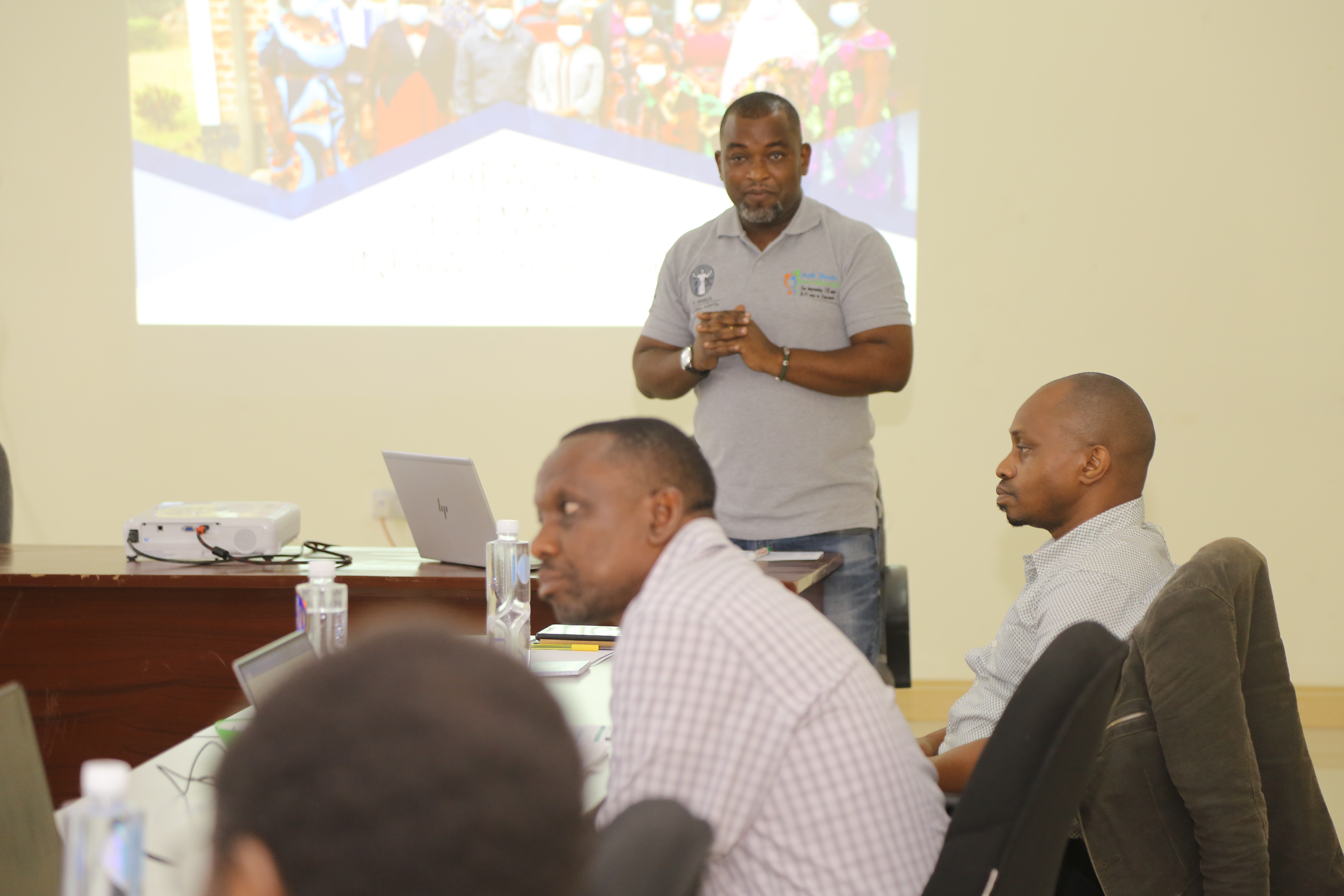
DISSEMINATION: Ifakara's "Telematics" project shares TB diagnostic study results

Ifakara Health Institute’s Health Telematics Infrastructure (HTI) project hosted a two-day meeting with stakeholders from April 28-29, 2022 in Morogoro region where they disseminated findings of its three-year study they conducted in collaboration with St. Francis Referral Hospital (SFRH). The study aims to improve HIV and TB diagnosis and treatment for patients in Tanzania’s rural areas.
Stakeholders invited to the meeting included representatives from the health sector, the government and non-governmental organizations.
The research findings for the HTI project were presented by Ifakara’s researchers who implemented the study – Dr. Jerry Hella, Dr. Michael Kasmiri and Dr. Robert Ndege. Participating in the meeting also was Dr. Allan Tarimo, who heads the Care and Prevention Services unit in the National Tuberculosis & Leprosy Programme (NTLP).
Dr. Tarimo gave remarks to officially open the meeting during which he shared grateful appreciation to Ifakara for extending an invitation to the research dissemination and expressed his expectations saying, “It is my hope that the findings shared from the project (Health Telematics) will provide an opportunity to make important improvements in our health centers and, in the health sector generally which will be based on today’s presentations and discussions.”
During the presentation, Dr. Kasmiri highlighted the main problems of TB diagnostic and treatment faced by the majority of patients (about 45%) in Tanzania, namely; time, accessibility and costs which could be solved by the project through the design, implementation, and evaluation of a new health telematics system adapted to local healthcare needs in Tanzania.
“Connecting rural village populations with central modern diagnostics facilities for TB/HIV diagnostics and care is a priority of Ifakara,” Dr. Kasmiri said.
Ifakara executed the HTI project aiming to improve service delivery for patients in the rural areas through a digital platform which supports tracking of specimen referral and return of results immediately from a centralized laboratory to the point of care.
The project was implemented in two health centers in Morogoro region: Mang’ula and Mlimba whereby TB tests were entirely done with the GeneXpert by the end of the project – a great achievement for the HTI project.
From the two project sites, Anna Ngatunga and Neserian Mollel, both Registered Nurses from Signal Dispensary and Mang’ula Health Center respectively shared comments on how the project went about. Both agreed on the positive impact the project had on patients including reducing costs among patients with the HTI system reliving them from unnecessary back and forth movement from the health centres to the hospital to follow up on their TB test results.
“The GeneXpert was very efficient and provided TB test results within short periods allowing patients to get their test results in time and start their dose intake early,” said Mollel.
The HTI project uses a digital platform system that can track TB patients' information in real-time. The information can be accessed by authorized nurses via a TB Diagnostics Dashboard on an Android phone and decisions are made based on a patient’s test results.
Ifakara scientists hope to integrate the HTI system with the MDH/Boresha Afya Telehub with the HTI API still waiting for approval. The HTI system will be open-source, and free to use in Tanzania and beyond.
Dr. Hella, in his final remarks after the presentation and discussion, urged stakeholders to “increase support that will improve efforts made on the HTI project and scale-up in rural and other parts in Tanzania.”
For his part, Dr. Ndege said, “Having seen the impact of using the HTI system while visiting project sites, I believe that if scaled up by implementing partners, the system can help the process of identification of TB patients, especially at the community and facility level i.e., when taking samples from dispensaries.”
Day two of the meeting involved discussions between participants based on the presented research findings of the HTI project.
The participants included representatives from; National Aids Control Programme (NACP), NTLP, President's Office, Regional Administration and Local Government (PO-RALG), Management and Development for Health (MDH), and Central Tuberculosis Reference Laboratory (CTRL).
Also in attendance were: Morogoro Regional Medical Officer (RMO) Dr. Kusirye Ukio; Morogoro Regional Tuberculosis and Leprosy Programme Coordinators (RTLC) Dr. Shigela Marco; Director of SFRH Dr. Winfrid Gingo and registered nurses from Signal Dispensary and Mang’ula Health Center.
The HTI project was conducted by Ifakara in collaboration with St. Francis Referral Hospital (SFRH), GIZ, eHealth Africa, Charité University of Medicine and funding from the German Corporation for International Cooperation (GIZ) and German Ministry of Science and Technology (BMBF).
View more meeting photos here.
